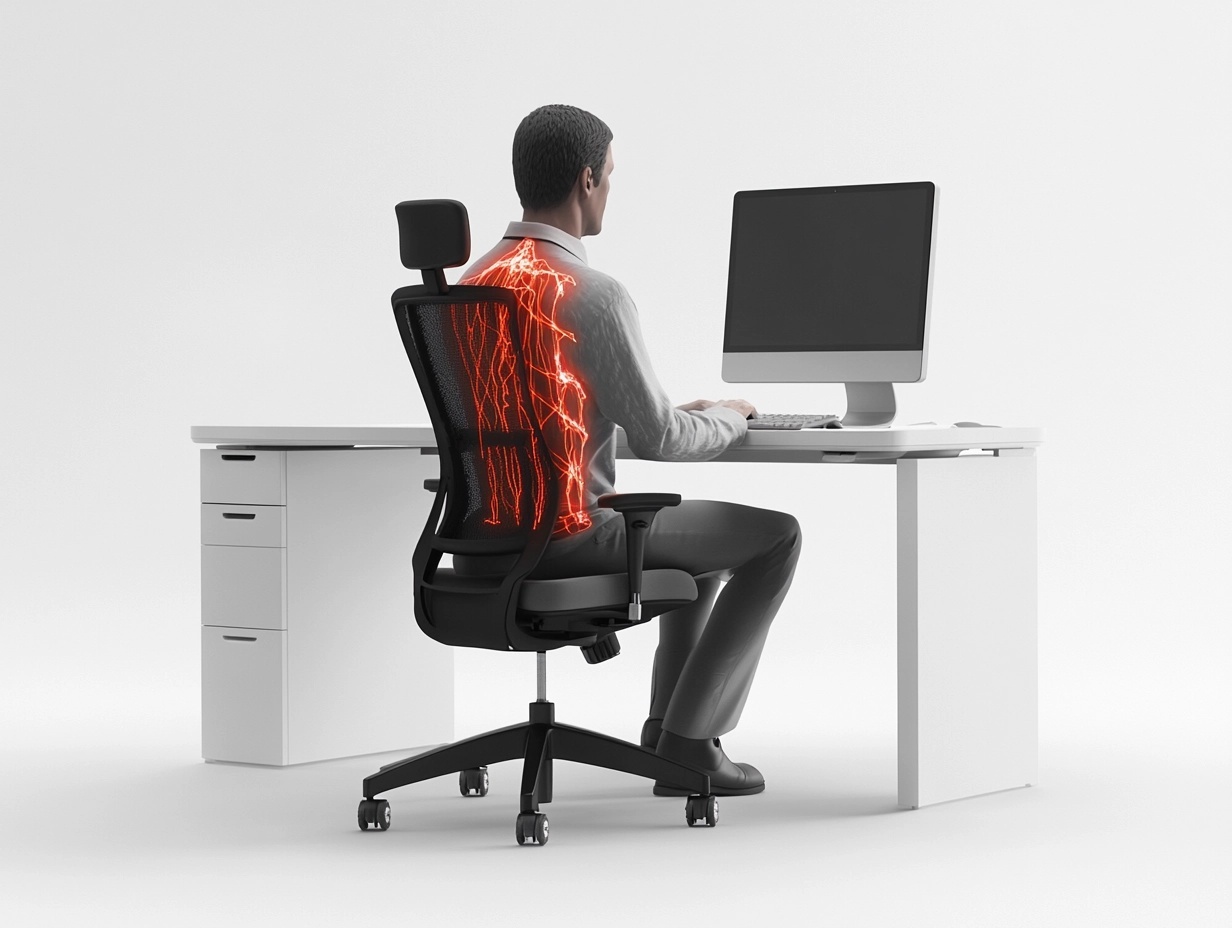
At Flex PT Care, we’ve seen a significant increase in desk-related injuries and discomfort since the rise of desk work. Whether you’re working from home or in a traditional office setting, prolonged desk work can lead to various musculoskeletal issues. Here’s your comprehensive guide to staying healthy while working at a desk.
Understanding Desk-Related Pain
The human body wasn’t designed for prolonged sitting. When we spend hours at a desk, we often develop what we physical therapists call “desk worker syndrome” – a collection of symptoms including neck pain, back discomfort, and shoulder tension. These issues develop gradually, often starting as minor discomfort before evolving into chronic problems that affect both work performance and quality of life.
Common Issues Facing Desk Workers
The most frequent complaints we hear from desk workers include:
• Upper back and neck stiffness • Lower back pain • Wrist and hand discomfort • Eye strain and headaches • Hip flexor tightness • Poor posture
The Impact of Poor Ergonomics
Poor ergonomics can significantly impact your body’s well-being. When your workspace isn’t properly set up, your body compensates by adopting awkward positions. Over time, these compensations can lead to muscle imbalances, joint stress, and chronic pain conditions. At Flex PT Care, we frequently see patients who’ve developed these issues due to improper desk setups, especially in home office environments where proper office furniture might not be available.
Creating an Ergonomic Workspace
Setting up an ergonomic workspace doesn’t have to be complicated or expensive. The key is understanding proper positioning and making adjustments with available resources. Your monitor should be at eye level, with your keyboard positioned so your elbows remain at roughly 90 degrees. Your feet should rest flat on the floor, with your hips and knees also at 90-degree angles.
Movement: Your Best Defense
Perhaps the most crucial aspect of preventing desk-related pain is movement. The best posture is your next posture, meaning regular position changes are vital for maintaining musculoskeletal health. We recommend setting a timer to remind yourself to move every 30-45 minutes. This doesn’t mean you need to take a long break – even standing for a minute or doing a quick stretch can make a significant difference.
Essential Stretches for Desk Workers
Throughout your workday, focus on these key areas:
• Neck and shoulder releases • Upper back mobility exercises • Hip flexor stretches • Wrist and hand flexibility work
Strengthening for Stability
While stretching provides immediate relief, strengthening specific muscle groups is crucial for long-term health. Your body needs strength in key areas to maintain proper posture during long work hours. We recommend focusing on core stability, upper back strength, and neck muscle endurance through specific exercises designed for desk workers.
The Role of Physical Therapy
At Flex PT Care, we take a comprehensive approach to treating desk-related pain. Our physical therapists begin with a thorough assessment of your work setup, posture, and movement patterns. We then develop a personalized treatment plan that addresses your specific needs and work environment.
Prevention Through Education
Education is a cornerstone of our treatment approach. We don’t just treat symptoms; we teach you how to prevent future problems. This includes understanding your body’s warning signs, knowing when to take breaks, and learning how to modify your workspace and habits as needed.

Customized Exercise Programs
Every desk worker’s situation is unique. That’s why we create customized exercise programs that fit into your daily routine. These programs typically combine stretching, strengthening, and mobility work, all designed to counteract the effects of prolonged sitting and computer use.
Virtual Assessment Options
Understanding that time is precious for busy professionals, we offer virtual ergonomic assessments. During these sessions, we can evaluate your workspace setup and provide immediate recommendations for improvement, all from the convenience of your home or office.
The Importance of Regular Maintenance
Just as your car needs regular maintenance, your body requires consistent care to function optimally. We recommend periodic check-ups to address any emerging issues before they become serious problems. This proactive approach can save you time and discomfort in the long run.
Beyond the Desk: Lifestyle Considerations
Your activities outside of work hours significantly impact your body’s ability to handle desk work. Regular exercise, proper sleep habits, and stress management all play crucial roles in preventing desk-related pain. We work with you to develop sustainable lifestyle modifications that support your overall musculoskeletal health.
When to Seek Help
While prevention is ideal, sometimes pain or discomfort has already set in. Don’t wait until the pain becomes severe before seeking help. Early intervention is key to preventing chronic conditions and achieving optimal outcomes.
Signs you should schedule an appointment include: • Pain that persists for more than a few days • Numbness or tingling in your arms or hands • Headaches that worsen throughout the workday • Lower back pain that doesn’t improve with basic stretching
Take Action Today
At Flex PT Care, we’re committed to helping desk workers maintain their health and productivity. Whether you’re experiencing current problems or want to prevent future issues, our team of experienced physical therapists is here to help.
Contact us today at (615) 391-4545 to schedule an evaluation. Let us help you create a healthier, more comfortable work environment that supports your long-term well-being.
Remember, your workspace should work for you, not against you. With the right setup, movements, and support, you can maintain a healthy, productive work life free from unnecessary pain and discomfort.

